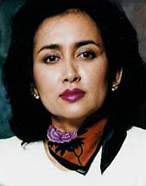 |
||
|---|---|---|
| CP Foundation | About CP Biennale | 2003 | 2005 | Contact Us | >||
           
|
||
|
Astari Rasjid's work, titled The Politics of Seduction (2003), reveal her critical view on the phenomenon of the consumptive society in the big cities, especially in Indonesia. The abundant emergence of shopping malls and advertisings, both in printed and electronic media, feed the public desire to shop and consume. By presenting various objects and intriguing imagery, Astari is commenting on the attitude of the people around her. The image of the huge handbag, for example, is borrowed from the object that represents the obsession of the upper-class women; while the imitation of the Harley Davidson motorcycle machine represents the "macho" image of the men. Also depicted there are lines of women in traditional kain-kabaya and a group of men with their motorcycles. The juxtaposition of the objects she depicts betrays some cynical and ironical nuances. The cutting edge capitalism has created the existence of bodies that depends on decorative objects; objects that are merely fleetingly impressive. It has also blinded the soul's eye in the heart of every human being and led the nation towards destruction. Through her work, Astari wants to comment on how the nation faces their social problems in an escapist way. She once said that the nation wants to have a "sense of control over their insecurity." The nation, she believes, is resisting the pressure of the problems by eluding or denying these problems. Here the body becomes the "locus of the battle of passions" that she often depicts using various metaphors. Astari always portrays the ambiguous "national body" in the midst of abundant objects, as the medium to reflect again on the existence of the soul in the time of vicious politics of seductions. Through her works, we can re-analyze the development of the social art (and politics) in the country, which must stay morally among, and at the side of, the people. At the time when the people are reluctant, we must again try to touch their heart. Rifky Effendy Born on 1953 in Jakarta. SELECTED SOLO EXHIBITIONS SELECTED GROUP EXHIBITIONS |
||
|
CP Foundation | About CP Biennale | 2003 | 2005 | Contact Us
Jl. Suryopranoto 67A, Jakarta 10160, Indonesia. ph. +62.21.3448126, 3853206 | fax. +62.21.3853203, 3853208 info@cp-foundation.org |
||
 The growth of the contemporary global economy and free market policy has overcome the geographic and cultural boundaries, creating great social problems in the society. The seduction of the cutting edge capitalism--as Jean Baudrillard once said--has created the public attitude that views industrial objects as something beyond their real functions, as some "magical" objects that offer new status and values for their owner. This is perhaps a form of fetishism. As the American artist Barbara Kruger once expressed in the eighties, "I Shop Therefore I Am," the shopping culture has become the daily ritual of the (American) modern society.
The growth of the contemporary global economy and free market policy has overcome the geographic and cultural boundaries, creating great social problems in the society. The seduction of the cutting edge capitalism--as Jean Baudrillard once said--has created the public attitude that views industrial objects as something beyond their real functions, as some "magical" objects that offer new status and values for their owner. This is perhaps a form of fetishism. As the American artist Barbara Kruger once expressed in the eighties, "I Shop Therefore I Am," the shopping culture has become the daily ritual of the (American) modern society.